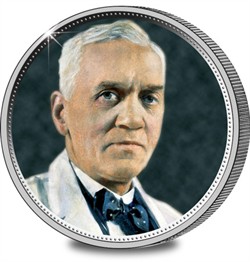
 |
Full name: Alexander Fleming
Born: 6th August 1881
Place of Birth: Ayrshire, Scotland
Occupation: Scientist
Died: 11th March 1955
|
Alexander Fleming was a bacteriologist and pharmacologist born
on 6th August 1881 in Ayrshire, Scotland. Fleming moved to
London at a young age with his family and trained as a doctor in
the city, he qualified with a distinction at the University of
London in 1906 before he began his research at St Mary's Hospital
Medical School with Sir Almroth Wright, a specialist in vaccine
therapy at the inoculation laboratory.
Fleming served in World War I as Captain of the Army Medical
Corps based in Boulogne in France, where he treated badly wounded
soldiers and helped perform amputations due to ineffective
antibiotics. Fleming returned to St. Mary's Medical School to
become a lecturer and to pursue his research.
Fleming worked very closely with Almroth Wright, who was an
influential mentor to Fleming. Wright believed that
immunisation and vaccinations were the key to preventing infectious
diseases and Fleming discovered the enzyme, lysozyme, a natural
antiseptic. In 1915, Fleming married a Greek colleague, Dr.
Amalia Koutsouri-Voureka, with whom he had a son, who became a
medical practitioner.
In 1928, whilst researching influenza, Fleming noticed a mould
forming on culture dishes. The mould had an active, bacteria
free substance encircled around it that he named
'penicillin'. Fleming discovered that the substance prevented
the growth of staphylococci. Fleming was made professor of
bacteriology at St. Mary's Hospital Medical School after producing
a number of papers on bacteriology, immunology and
chemotherapy.
Scientists Howard Florey and Ernst Boris Chain developed
penicillin further as an antibiotic drug, which was mass produced
in America in 1940 as a very important medicine for fighting
bacterial infections, still used today. In 1943, Fleming was
made a fellow of the Royal Society and Emeritus Professor of
Bacteriology at the University of London in 1948.
Florey, Chain and Fleming were collectively awarded the Nobel
Prize in Medicine for their extraordinary discovery and Fleming was
knighted in 1944 and elected fellow of the Royal Society.
Alexander Fleming died on 11th March 1955 and was buried at St.
Paul's Cathedral.